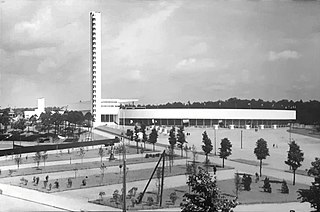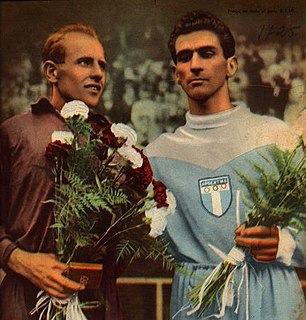 W
WAt the 1952 Summer Olympics in Helsinki, 33 athletics events were contested, 24 for men and 9 for women. There were a total number of 963 participating athletes from 57 countries.
 W
WThe men's 110 metres hurdles event at the 1952 Summer Olympic Games took place July 23 and July 24. Thirty athletes from 20 nations competed. The maximum number of athletes per nation had been set at 3 since the 1930 Olympic Congress. The final was won by the American Harrison Dillard. Dillard's compatriots, Jack Davis and Arthur Barnard, took 2nd and 3rd place. It was the fourth of nine consecutive American victories, and the tenth overall gold medal for the United States in the 110 metres hurdles. It was also the second of four consecutive American podium sweeps, and the sixth overall sweep by the United States in the event.
 W
WThe men's 200 metres sprint event at the 1952 Olympic Games took place between July 22 and July 23. There were 71 competitors from 35 nations. The maximum number of athletes per nation had been set at 3 since the 1930 Olympic Congress. The final was won by American Andy Stanfield. Americans also took silver and bronze as the United States swept the medals in the event for the third time.
 W
WThe men's 400 metres hurdles event at the 1952 Summer Olympics took place July 20 and July 21 at the Helsinki Olympic Stadium. There were 40 competitors from 24 nations. The maximum number of athletes per nation had been set at 3 since the 1930 Olympic Congress. The final was won by American Charles Moore. It was the nation's third consecutive and eighth overall victory in the event. The Soviet Union, in its debut, and New Zealand each earned their first medal in the men's 400 metres hurdles, with Yuriy Lituyev's silver and John Holland's bronze, respectively.
 W
WThe men's 1500 metres event at the 1952 Olympics took place between July 24 and July 26. Fifty-two athletes from 26 nations competed. The maximum number of athletes per nation had been set at 3 since the 1930 Olympic Congress. The event was won by Josy Barthel of Luxemburg; to date, this is the only Olympic gold medal won by a Luxembourger, though Luxembourg-born Michel Théato is credited for winning the 1900 Marathon for France. Germany won its first medal in the 1500 metres with Werner Lueg's bronze.
 W
WThe men's hammer throw event at the 1952 Summer Olympics took place on 24 July at the Helsinki Olympic Stadium. There were 33 competitors from 18 nations. The maximum number of athletes per nation had been set at 3 since the 1930 Olympic Congress. The event was won by József Csermák of Hungary, the nation's second consecutive victory in the event. Imre Németh, who had won four years earlier, took bronze; he was the fourth man to win multiple medals in the event. Silver went to Karl Storch of Germany.
 W
WThe men's high jump at the 1952 Olympic Games took place on 20 July at the Helsinki Olympic Stadium. Thirty-six athletes from 24 nations competed. The maximum number of athletes per nation had been set at 3 since the 1930 Olympic Congress. American athlete Walt Davis won the gold medal and set a new Olympic record. It was the Americans' 10th victory in the men's high jump. José da Conceição won Brazil's first medal in the men's high jump, with bronze.
 W
WThe men's long jump at the 1952 Olympic Games took place on July 21 at the Helsinki Olympic Stadium. Twenty-seven athletes from 19 nations competed. The maximum number of athletes per nation had been set at 3 since the 1930 Olympic Congress. American athlete Jerome Biffle won the gold medal. It was the United States' sixth consecutive and 11th overall victory in the men's long jump. Hungary earned its first long jump medal with Ödön Földessy's bronze.
 W
WThe marathon at the 1952 Summer Olympics was held on 27 July on a course running from the Helsinki Olympic Stadium to Korso, Helsinki Rural Municipality and back. Sixty-six athletes from 32 nations competed. The maximum number of athletes per nation had been set at 3 since the 1930 Olympic Congress.
 W
WThe men's pole vault was an event at the 1952 Summer Olympics in Helsinki, Finland. Twenty-eight athletes from 18 nations competed. The maximum number of athletes per nation had been set at 3 since the 1930 Olympic Congress. The final was held on Tuesday July 22, 1952. The event was won by Bob Richards of the United States, the nation's 12th consecutive victory in the men's pole vault. Another American, Don Laz, took silver. Ragnar Lundberg's bronze was Sweden's first medal in the event since 1912.
 W
WThe men's shot put event was part of the track and field athletics programme at the 1952 Summer Olympics in Helsinki, Finland. Twenty athletes from 14 nations competed. The maximum number of athletes per nation had been set at 3 since the 1930 Olympic Congress. The competition was held on 21 July at Helsinki Olympic Stadium. The finals were swept by the United States, with Americans Parry O'Brien taking the gold medal, Darrow Hooper earning silver and Jim Fuchs receiving his second consecutive bronze medal in the event. It was the 10th victory for an American in the event, and the fifth medal sweep for the United States. Fuchs was the third man to win multiple medals in the shot put.
 W
WThe men's triple jump at the 1952 Olympic Games took place on 23 July at the Helsinki Olympic Stadium. Thirty-five athletes from 23 nations competed. The maximum number of athletes per nation had been set at 3 since the 1930 Olympic Congress. Brazilian athlete Adhemar da Silva won the gold medal, breaking the world record twice. It was Brazil's first medal and first victory in the men's long jump. All three of the nations represented on the podium were relatively new to the event in the Olympics; Brazil had sent triple jumpers in 1948, but the Soviet Union and Venezuela each won medals in their first appearance.
 W
WThe women's shot put event at the 1952 Summer Olympics took place on 26 July at the Helsinki Olympic Stadium. Soviet athlete Galina Zybina won the gold medal and set new world and Olympic records.